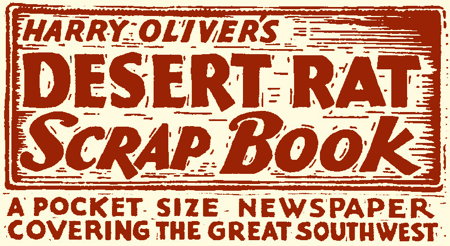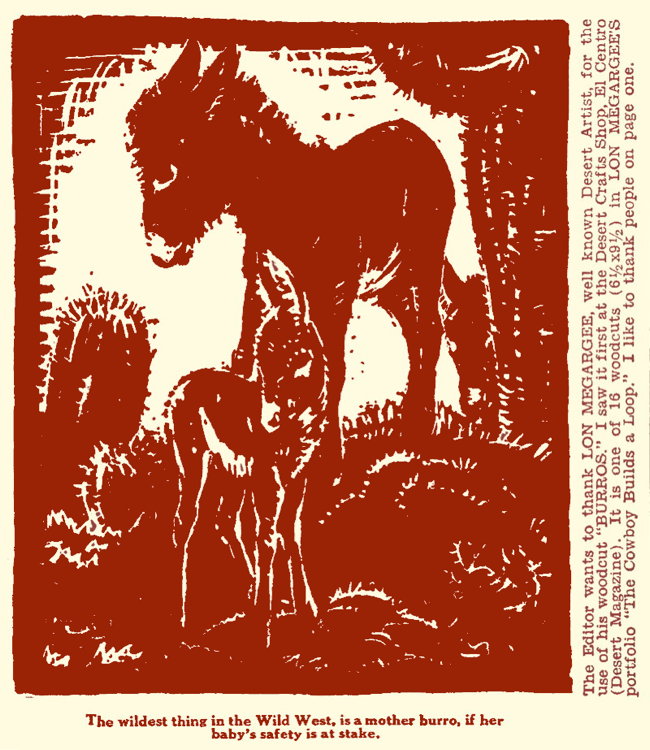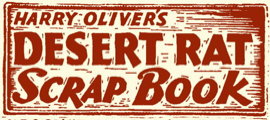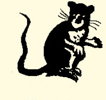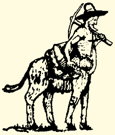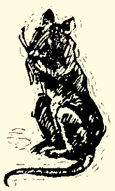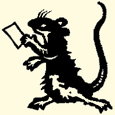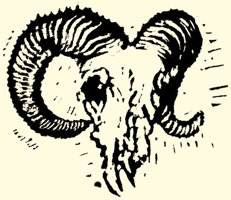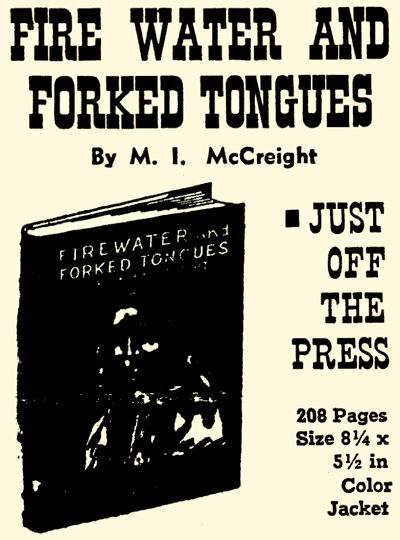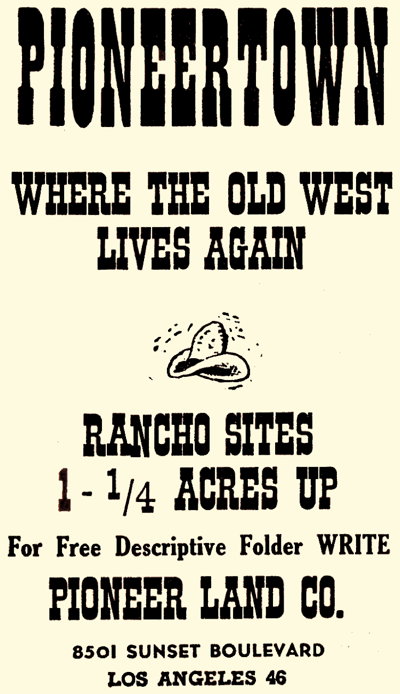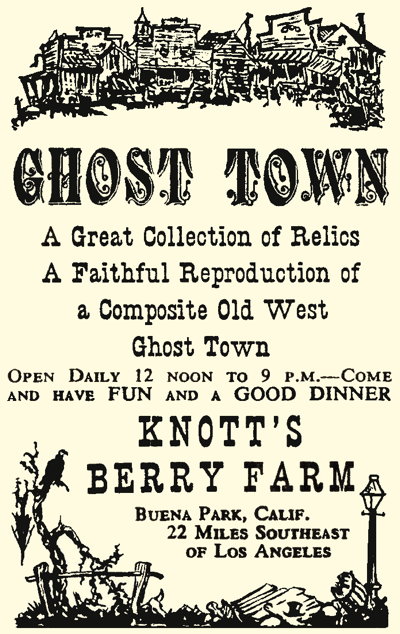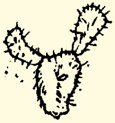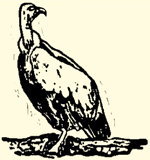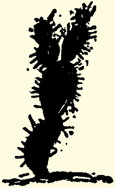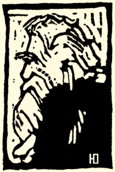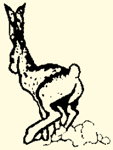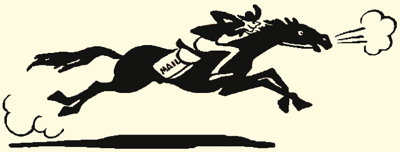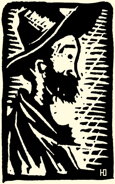BACK HOME COVER THIS IS HISTORICAL INFORMATION ONLY
PRICE 10 Cents . . . . . . . A tenth part of a 1948 Dollar
(Almost like I was giving it to you.)
PACKET ONE OF POUCH TWO
PUBLISHED FOUR TIMES A YEAR
Only Newspaper in America you can open in the wind
DESERT RAT SCRAP BOOKPAGE 2
Grasshoppers have rheumatism.
ONLY ONE EDITOR CAN SAY
or would say
This paper is not entered as 2nd class mail, because it's a first class newspaper. It is the smallest newspaper in the world and the only 5 page one—a newspaper that grows on you as you turn each page—excepting page 5. And it's the only newspaper in America you an open in the wind. Its Editor boasts that for so small a paper he gives you a generous amount of typographical errors, and that all news printed hs been tested by time.
Published at Fort Oliver, 1000 Palms, California, 4 Times a Year
This giant spread hang's over the door at Fort Oliver—it was given me by the last Indian to live in the Borego Desert.
The escutcheon of Fort Oliver.
ON THE NEWS STANDS 10c A COPY
But sometimes they don't have them.
ONE YEAR BY MAIL — 4 COPIES 50¢
Darned if I am going to the trouble of mailing it for nothing.
10 Years ................... $5.00
100 Years ...................$50.00
Something to think about!
|
Published by HARRY OLIVER
FORT COMMANDER |

|
PICTURES ARE BY THE AUTHOR, MANY OF THEM WOODCUTS—
I did all but the spelling.
Most of this material, pictures, and writing is copyrighted—
And Branded.
Typography on this palper is by Guy A Genung.
Green Lantern Print Shop, Corona, Calif.
☆ ☆
Presswork by Indio Date Palm
☆ ☆
Printers don't drink more than other people—
iT JusT $Hows Up MoRe iN pRinT.
[ EDITORIAL ]
Word Picking
The paper cover of my Dictionary fell off in two pieces, it was torn a couple of times in the last year and I stuck it together because of the 6 lines in a square below the title.
"The difference between the right word and the almost right word is the difference between lightning and the lightning-bug.
—MARK TWAIN
When a fellow like me who can't spell thinks of what he thinks is the right word and then can't spell it, he sometimes has to change the whole sentence. Looking up a word in the dictionary is not so bad if you an guess what the first two letters are.
I guess I use lots of lightning bugs, where I should have used lightning.
BUFFALO CHIPS
Many have told me I was not charging enough for this paper (some that were the most persistent have papers to sell of their own).
I set out to print a paper for 10c—and I will do it and like it—but you must get it while its on the news stand—if you write me for back numbers starting from right now, all back numbers are 20c and this Packet goes up to 20c as soon as the next copy hits the water holes.
Lots of work sending out old Packets.
My dog is a comedian, he is better than Allen or Morgan. Of course I admit Fred Allen and Henry Morgan of Morgan's Corner are good, but you can't tune in on them 24 hrs. a day, like you can my dog "Whiskers."
The Old Ghost Town Type I used in the last Packet has found its way to many a sign painter's shop, so the mail tell's me—there' some new (OLD) Type Faes in this packet.
As this packet goes to press the hottest bit of news in the desert is the "Lost Peg Leg Mine" trek at Borego Desert, January 1st, Ray Hetherington of Knotts Ghost Town, Homer A. Stuart (Desert Spotlight), and L. B. Harrison of Western Books, 331½ Hill Street, Los Angeles, started it and all old timers in the desert are sure helping to give it a royal send-off.
[ REMEMBER ]
You should subscribe for this paper and save the Packets for Junior—cuz no one is going to be crazy enough to print stuff like this after I am gone.
You got to live in a fort to do it.
OLD TIMERS
Sheriff Bans Western Hats on His Deputies
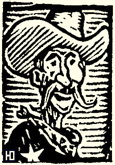 One of the last vestiges of the Old West in San Bernardino County government received a death blow in July.
One of the last vestiges of the Old West in San Bernardino County government received a death blow in July.
Considering the source, the Old West was inclined to consider it scarcely less than a stab in the back.
Sheriff's deputies here have always worn ordinary civilian clothes topped invariably with a broad-brimmed western hat. Deputies considered that what was good enough for Wyatt Earp was good enough for them.
None suspected that James W. Stocker, and new Sheriff, would be the man to change all that.
"Times change and we'll change with them," said Stocker today in refusing to rescind an order putting his deputies in uniforms. Literally the crowning indignity, say the old-timers, is that a semimilitary cap replaces the old Stetson.
They shake their heads over an old cattleman, of all persons, casting away the hat that's the brand of the range.
—The Grizzly Bear.
THE INDIAN GHOST
of THOUSAND PALMS
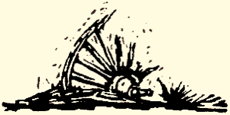 The ghost of Chief Pushawalla watches Paul Wilhelm of Thousand Palms Oasis. The Chief traded this oasis to Paul's dad (the Lucky Dutchman) abbout 50 years ago for a buckboard and two mules. The razed mules died later, with the Chief, beause he couldn't get them out of the wash. This wass during the cloudburst of 1899.
The ghost of Chief Pushawalla watches Paul Wilhelm of Thousand Palms Oasis. The Chief traded this oasis to Paul's dad (the Lucky Dutchman) abbout 50 years ago for a buckboard and two mules. The razed mules died later, with the Chief, beause he couldn't get them out of the wash. This wass during the cloudburst of 1899.
Yes, the Chief watches Paul as he digs into the old Indian graves and watches him as he plants palm seeds and tiny palms between the giant palms of 200 years. He laughs at the little plants for Paul is trying to gild the lily. Can't do much to what is already the prettiest darn Oasis on this Desert.
☆
Old timer, Desert Steve Ragsdale, says the way to make coffee is take one pint coffee, one pint water, boil, and drink straight.
FOOD RIOTS
Mumpy little chipmunks, their cheeks bulged with peanuts,
Squabble with the Blue-Jays to grab the most free nuts.
In a letter from Don Blanding
PACKET ONE DESERT RAT SCRAP BOOK PAGE 3
José and the B u r r o

from "TODO" MEXICO, D. F. Octubre 24, 1933
By HARRY OLIVER
I wrote this story while in Mexico City as Art Director for the Motion Picture VIVA VILLA, (1933). The Editor of the Magazine TOTO translated it to spanish.
Here it is in English:
Matador José walked each morning along the terraced gardens of Tlaxcala. He would pass around the hill with his right side to the low wall and if he saw a señorita approaching he would put his right foot on the high edge of the path to give a deceptive squarness to his shoulders. When there was no one in sight, he would limp to the outher edge and look down on the pulque fields.
One October morning, through a fog, he saw the ghostly shape of a white burro which he had been watching for many days. The burro's movements were slow, uncertain—yes, like his own. Who would recognize in his crippled self the winged-footed matador who hundreds of times had miraculously escaped the mad onslaguht of enraged bulls and brought an admiring public to his feet? Did those cheering crowds forget that the spirit of a matador is never broken, that only his body can be destroyed? A peon would know, a peon would tell you the same can be said of a burro.
Making sure that no one saw his awkward efforts, José climbed down to the pulque fields. The fields were flanked by maguey plants whose vicious spikes threatened trespassers. But he had detected a gap in the formidable hedge and through it he approached the burro. The burro did not see him. As José had guessed, he was blind—blind and made to graze in a field edged with stilettos which reached out to stab him.
José led the burro toward the opening. Those points on the maguey were malicious spying eyes. No! They were ten thousand matadors holding at a poor blind beast.
The new doctor told José to use a cane and to walk daily, not much at first. José threw the cane through the window as soon as the doctor left. Now, walking with some of his weight on his blind friend's back, as he does each day, he feels like his old self. He thinks with pride; see how we guide each other! And he is happy. Their doctors predict a sure cure for both of them.
The Mexico City eye specialist will not tell José that his burro's eyes have been well for a month. The wisdom of doctors is profound.
PUZZLE — Dry Camp Blackie, our old desert rat friend, blew into town the other day with a big puzzle on his brain. He's the lieutenant and chief bodguard out at Oliver's famed ol Fort Oliver at 1000 Palms, you know, and he sez he can't understand why an historic old place like the fort isn't mentioned in any history books. "Shucks," he said, "I know it's old because just this week I helped Harry finish the ruins of the west wing!"
![]()
I asked Dry Camp Blackie how's things— Some's good, some could be better he answered— but I was just thinkin' wouldn't it be great if we had a full moon every 2 weeks in the Desert.
County jails is crowded and dirty and the grub ain't fit for a sheep camp. They'll have to be spruced up a lot if they're ever to attract anything more'n a low, cheap class of trade.
—Foxtail in Prairie Farmer.
The next packet will be the Mojave Desert and Ghost Town number.
By HARRY OLIVER
First Printed in Life Magazine, June, 1932
Scotty ain't no more. He ain't dead or gone, mind you, but still there ain't no more Scotty. I know it's kinda confusin' but facts is facts, an' we feel like there's been a furneral even when we know there ain't.
It come to a head yesterday. Haywire Johnnie rigs up a sure-fire, all hitting, no-missing cuspidor to take the place of the sawdust box. It was a brass cuspidor. Someone willed it to Liminatin' Lem an' he "give it to me. It's got fine proportions an' can accommodate all my customers. First time the boys used it, they discovered if you hit it dead center it makes a loud plink. That gives Johnnie an idea.
He comes over to the store ahead of time yesterday morning to fix a contraption that'll fool the boys. All it calls for is a piece of haywire, a ruber band an' a string. It looks something like a mouse-trap and is small enough to be hid behind the cuspidor with the manipulatin' string round the end of the counter. Every time Johnnie pulls back on the string an' lets go, he stretches an' releases the rubber band which is attached to a knobby-headed wire, and' then the knob hits the side of the cuspidor with a deceivin' plink.
☆ ☆ ☆ ☆ ☆ ☆ ☆ ☆
A ROW OF STARS
No reason, just an interruption, why? Because Dry Camp Blackie says all BIG NATIONAL MAGAZINES do it. More stars at the bottom, yes. We have lots of stars here in the Desert and we see 'em every night. Now go ahead and read the story.
☆ ☆ ☆ ☆ ☆ ☆ ☆ ☆
Johnnie first shows his skill an' technique to Gopher Joe an' collects a two-bit side bet with a trick shot that was supposed to turn around the corner at the finish and light in the gabboon, an' did, for all joe knew, hearin' that home-base gong.
Then Gopher Joe bet four bits with Liminatin' Lem, who came in next, that he couldn't sit where he was an' spit without hittin' the floor, but lost because Lem 'liminaed the chance by spittin' out of the window.
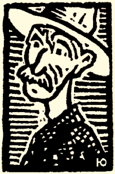 Then in come Colonel Kashin an' Borego Valley Scotty. Johnnie turns around an' gives a knowin' wink to Flapjack, who's sittin' by, an' who nearly always loses to Scotty. "Here's your chance to make your money back," he says.
Then in come Colonel Kashin an' Borego Valley Scotty. Johnnie turns around an' gives a knowin' wink to Flapjack, who's sittin' by, an' who nearly always loses to Scotty. "Here's your chance to make your money back," he says.
So Flapjack makes a five dollar bet with Scotty that he can spit around the stove and land square in the spittoon. Scotty digs up the money to take him on and Johnnie sees to it that he loses. Scotty paid with a smile, like he liked it and then set all the boys up to a round of cigars an' soda pop. Strange doin's for Scotchman, but that's the way sScotty's always been.
Kashin makes a wisecrack about his Scotch generosity an' Scotty tells us how for thirty years he's been trying to live down the Scotch jokes an' be different till he got so used to givin' till it hurt that he kinda liked the pain. He tops it all off with another round of pop.
Then I remember a letter came in for Scotty which I'd been puzzlin' over all day, tryin' to figure the funny stamp and strange markin's all over it.
"It's from Switzerland," he says after stoppin' for breath. "I've hae'n one hundred htousand dollars left me and a half interest in a cookoo clock factory."
"Well that's nothin' to get sore at," says Kashin. "You ought to be happy." "Maybe you think it nothing to get sai'r aboot," says Scotty. "Here I've been mai'r than thirty years tryin' to be what a Scotchman ain't and noo I'm findin' oot I'm aw wrong. The years war wasted, for the bloke I thought was my father was only me frien' and foster parent. It makes me heart sair and gars me greet to ken I'm no Scotch after aw'. I've been deceived. The man who was really my faither turns not to be a Swiss."
Borego Valley Scotty says, he'll have a hell of a time living down that accent.
Whiskers and Christmas
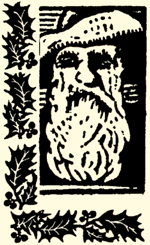 We Desert Folks don't always have much on our minds, but about half of us have whiskers on our chins, rangin' from Maltese to Tobcco-juice roan, and bein' folks that talk only about what we know and see, we've gone over this whisker business a number of times. Here's the result of the last combin': Whiskers is worn most by high-brows and low-brows, extremes both ways. They seem to come with thinkers; the low-brow tells you what he thinks while the high-brow deals out somebody else's thoughts. As to the beards themselves we can't see there's much difference. We come to this conclusion last fall when Gopher Joe was pilotin' round that high-powered archeologist who come all the way out here from Washington to look for Indian beads, cause both their beards looked like they came out of the same litter.
We Desert Folks don't always have much on our minds, but about half of us have whiskers on our chins, rangin' from Maltese to Tobcco-juice roan, and bein' folks that talk only about what we know and see, we've gone over this whisker business a number of times. Here's the result of the last combin': Whiskers is worn most by high-brows and low-brows, extremes both ways. They seem to come with thinkers; the low-brow tells you what he thinks while the high-brow deals out somebody else's thoughts. As to the beards themselves we can't see there's much difference. We come to this conclusion last fall when Gopher Joe was pilotin' round that high-powered archeologist who come all the way out here from Washington to look for Indian beads, cause both their beards looked like they came out of the same litter.
Speakin' of beards reminds me of something that happened last Christmas. Us Borego folks got together and decided to give the kids a real Santa Claus for their school house celebration. Year before last we picked Kelsey 'cause he has a rosy, plump face and is a right big hombre, but one of the hooks on his ears gave way and the phoney beard fell of, so this year the folks wanted real whiskers or no Santa Claus.
Liminatin' Lem was elected to go up Rock Candy Gulch and fetch back Old Holladay who'd been up there prospectin' and raisin' whiskers for the last fifty years. There was no question about him sportin' one of the finest flowin' white beards a-shootin' out sideways and reachin' down to his belt. Lem brings him in, parks him with the Courtneys and reports back to us that the old fellow's glad he's due for a couple of days of good food.
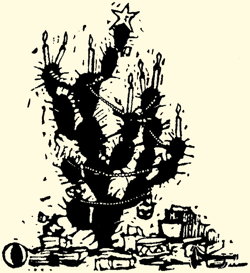 Next day everybody was helpin' pack the benches into the school house when a stranger come along. Leastwise he seemed like a stranger. Then someone shouted, "Leapin' lizards! It's Holladay."
Next day everybody was helpin' pack the benches into the school house when a stranger come along. Leastwise he seemed like a stranger. Then someone shouted, "Leapin' lizards! It's Holladay."
Honest, I couldn't believe my eyes. Holladay's whiskers was gone; he looked like a shorn sheep. Everything stopped. Our ideal Santa Claus had gone up the flue.
Old man Holladay's all broke up and tells he couldn't help it and why. He goes into detail about how he'd packed them whiskers for years, slept close to campfires and never singed 'em, worked one winter on a buzz saw and never lost a hair, even gave up chewin' tobacco once they went white, and always hoped he'd be buried with 'em on.
They was his pride and joy and never gave him any trouble till last night. Here's what happened: He was combin' 'em and feelin' pretty proud that he'd been picked for Santa Claus when that oldest Courtney boy commenced to question him, finally askin' him where he put them whiskers when he slept. He says he couldn't answer the boy 'cause he'd never given it a thought, but that night there didn't seem to be any place for 'em.
He tried puttin' 'em everywhere; over the covers, but that didn't seem right—under the covers, and that didn't seem right, and he even got up and wrapped his bandana around 'em, but there just weren't no place to put them whiskers. They seemed to pull and torture him.
He rolled and tossed, sat up and wondered why he'd ever raised 'em and couldn't for the life of him figure where he'd been puttin' 'em all these years. Knowin' there'd never be any sleepin' with 'em again, and a-tryin' to keep 'em for the kids' Christmas, he put rocks in his boots lacin' 'em up tight, tryin' to get his mind on his feet. He hoped that one tooth of his would start achin', or even his rheumatism come back again, but nothing could take his mind off his problem of where to park those whiskers.
"I had to find the sheep shears or go mad," he says to me, as big tears rolled down his cheeks.
Well, we sent Accumulatin' Luke clear to Clark Lake for Captain Ashby, the second best whiskers round Borego. Santa Claus No. 2 did pretty well and no one wold have known about his peg leg if it hadn't been for that knot hole near teacher's desk.
From the Editor's book Desert Rough Cuts, A Haywire History of Borego Desert, (Out of print ten years). These are the yarns the old keeper of the "Busy Bee" store told.
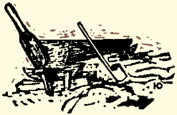 Oldest Mine Library Will Be Reopened
Oldest Mine Library Will Be Reopened
California's oldest library devoted exclusively to mining will be reopened in San Francisco, State Mineralogist Olaf P. Jenkins announces.
Containing more than 7000 volumes on minerals and mining engineering, the library is reputed to be the largest of its kind in the United States.
Presently located in the ferry building, Librarian Roy Nielson is operating under temporary conditions while new cases are being installed.
Origin of Sign Language Among Indians
As there were many Indian tribes on the plains, so there were many languages and dialects. The Frequent contact of tribe with tribe made some sort of common language necessary and the sign language grew up as a adaptation to the peculiar conditions in the open country. The Indian on the rock in the distance asks, "Who are you?" by raising the right hand, palm in front, and slowly moving it right and left. Answer is made with, say the tribal sign for Pawnee. The sign for peace is made by the Indian laying down his weapons and raising his hands high above his head. In such ways the tribe from the headwater of the Missouri could communicate with a people from the Rio Grande for the sign language was a universal language of the plains. Its development was an intellectual achievement of great importance.
" Pony Express Magazine, Placerville, Calif. (25c a copy)
The mail has brought me the first edition of 101 Adventures of PANAMINT PETE, by Leonard F. Murnane, Editor of the TRONA ARGONAUT.
Leonard has done a fine job with his 101 Desert Tall Tales of Panamint Pete. His humor is as dry as his desert and his wit is as sharp as the cactus in that desert. $1.50 is the price. Send it to the TIMES PUB. CO., Randsburg, Calif.
POOR MAN
It's fine to live in a democratic country where any poor man is just as good as any other poor man and a blame sight bettrn'n any man that's poorer.
Foxtail in Prairie Farmer.
Word about Ted Hutchinson the desert Plant Wizard of Rancho Mirage,—
The fellow that has talked Desert Holly, Smoke Tree and other desert trees and shrubs in to getting into tin cans and growing, so you may plant them at your desert place — Well it seems that being a plant genius, is just being willing to work 24 hours a day.
For Ted gets up at 4 A.M. (which is starting time for a colony of black harvester ants) gets himself a light sets in the line of ant travel with a package of radish seed and a pair of tweezer—takes from the thieving ants his rare "Brandegea Bigelovi" seed—giving the ant in exchange a radish seed.
Just a Desert (trade) Rat is Ted.
Desert burros, who kept discreetly out of sight during meat shortage, are again galloping up to greet tourists who stop their cars.
Barstow, Printer Review
|
THE MAIL |
Medicine to Weary Bones
You out there living in just ordinary places seem to know how much good this Desert Sun Shine of mine can do to sick folks, letters like this come most every day.
Please mail one pouch of the DESERT RAT SCHAP BOOK to each of these invalids. I think they'd much rather have them than those nasty little illness cards with pansies and goofy verses. If you don't have four back copies, then take out the rest when you publish some more, but back copies now will do them more good than future copies when they are up and busy again. One dollar enclosed.
Mrs. K. M.
Page 4 PACKET ONE POUCH TWO — THE BURRO NUMBER
THIS PAGE IS DEDICATED TO THE WORLD'S GREATEST OPTIMIST—THE DESERT PROSPECTOR
Harry Oliver's
DESERT RAT Scrap Book
PIONEERTOWN
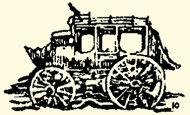 BACK IN 1850 AMADOR county up in the Mother Lode, named a town Pioneer, it still has a post office.
BACK IN 1850 AMADOR county up in the Mother Lode, named a town Pioneer, it still has a post office.
TODAY in a rugged desert valley (elevation four thousand feet), a group of Western showmen headed by Dick Curtis have staked out a spot and are building a reproduction of a Gold Old Western Town naming it Pioneertown.
With 25,000 acres of the most beautiful scenery in the Mojave Desert in their layout, they can't go wrong. Hrosemen will love it. NO MOTORVEHICLE WILL BE ALLOWED ON MAIN STREET.
☆ ☆
Want a Ghost Town? . . .
BEATTY — Rhyolite, famous ghost town of Death Valley country located three miles west of Beatty, is for sale. N. C. Westmoreland, according to local report, has determined to dispose of his entire holdings in the old camp. Westmoreland bought most of Rhyolite at public auction and for many years operated the Ghost Casino on the abandoned railroad station there. Rhyolite reached peak of its boom with 10,000 population in 1906, after Shorty Harris made his strike at adjacent Bullfrog.
—The Desert Magazine
California Has Everything
Recent Sacramento dispatch from the State Game and Fish Commission to the effect that "the stealthy cougar, California's Mountain Lion still roams in the wilds of at least 10 California counties." For the month of August from 10 counties 19 lions were turned in for bounty.
—Sacramento Union
This is a sensational book in which the great Sioux Chief—Flying Hawk—gives the Indian's own version of U. S. History. A priceless document, carefully recorded and compiled over a period of many years, containing the old Sioux warrior's indictments of the white man's treatment of the North American Indian. His tribal history recorded and thumb-printed for posterity!
Price $3.50 Deluxe $5.00
Trail's End Publishing Co., Inc.
725 Michigan Boulevard
Pasadena 10, Calif.
The WELLS FARGO HISTORY ROOM, located in the bank's building at 30 Montgomery St., contains relics of pony express and covered wagon days; an original Hangtown stagecoach; early western franks and postmarks, firearms, pictures and documents.
Open to visitors 10 to 3 daily
10 to 12 Saturdays.WELLS FARGO BANK &
UNION TRUST CO.San Francisco
ESTABLISHED 1862
E A R L Y A M E R I C A N
Propaganda
The only good Indian is a dead Indian
"It is greatly to be wished that some competent person would write a full and true history of our national dealings with the Indians. Undoubtedly the latter have suffered terrible injustice at our hands>
THEODORE ROOSEVELT
M. I. McCreight's book FIREWATER AND FORKED TONGUES is the book Teddy asked for.
See ad on this page—The Ed.
BURROS
AN INTERVIEW
| Q. | Just what do you know about burros? |
| A. | Perhaps I know just about as much as you do, but ask me some of the things you don't know. |
| Q. | How can you stop a burro from braying, |
| A. | I've read that if you take an old shot bag and fill it full of sand—then tie it to the burro's tail he can't bray, as a burro must lift its tail to give forth with a powerful hee-haw. This way all you get is a fizzled-out, half finished yawn of a bray. But be that as it may, I doubt very much if you can stop a burro from braying. Why stop them? It's just their way of talking—you can beat them to the bray by feeding them on time, and keeping them from being lonesome. |
| Q. | How do you think they got their long ears? |
| A. | According to legend, one of the donkey tribe walked into quicksand, which alone is one big weakness of donkeys as it causes them to lose all sense of reason; this donkey was carrying the Virgin and the infant Jesus. San Gabriel, watching from above, noted his danger, and pulled him out by the ears, which then stretched to such a length as all burros now have. Thusly, in water all its descendants lose their courage, seems as though they always depend upon heavenly aid to get them out. |
| Q. | Just how did you get to know burros so well? |
| A. | I have had four burros, one I raised from birth, raised it on a bottle, a pinto of seven distinct shades. |
| Q. | Ever have any trouble with burros? |
| A. | Yes, the pinto (I called Paint) could untie knots, and one bright morning got away and went shopping a mile away at a Safeway store, ate $60.00 worth, so the storekeeper said. Why, you remember, Dad, you had to pay it, saying burros belong in the desert. |
 "Wait a Minute - I Can Tell You"
"Wait a Minute - I Can Tell You"
Several months ago someone asked me if I knew the name of the "Carrier" in which Indian mothers strap their Papooses on their backs—being certain that I knew, if I could only remember, but I didn't know — However, after asking dozens of people — still with the same result—I went to the public Library, where the Librarian was sure she knew but just couldn't remember—we couldn't find it in the Indian Books. So, she phoned the head of the Oklahoma Historical Society at the State Museum, whgo finally told us that each Indian Tribe had a nae of their own, but the American name is Cradle Board. (Webster syas "Cradle Board—The Board to which an infant is strapped by some north American Tribes.")
Thanks Peggy. I couldn't remember. Ed.
See the World Famous
VIRGINIA CITY
NEVADAONLY 22 MILES FROM RENO
DON'T MISS THIS ITMUSEUM OF MEMORIES
For Two Bits (25c) Paul Smith of the Museum of Memories will mail you a copy of his "Drama of the Comstock Lode" which contains the story of this famous historic old mining town.
Miners Ten Commandments......25c
Pony Express Poster...................15c
PAY DIRT
Every so often the stories of Cactus Kate are taken out of moth balls anywhere from Los Angeles to St. George, Utah, and told to tourists, who of course never believe them, but the starnge thing is most of the are true.
Cactus Kate did race and beat a train from Barstow to Las Vegas before the days of the highway; she did carry seven men a full block down Fremont Street, Las Vegas; and she did do scores of other things attributed to her.
The only lthing you should never tell a tourist is that Cactus Kate was a Stutz Bearca ar driven by a representative of the Automobile Association of Southern California.
—Nevada Magazine
Outdoor Housekeeping
Cactus Slim Mooten old timer around Palm Springs (Long before Air Conditioning) — says the way to keep your cookin' pots shiny and black with a black that won't rub off is to burn green grease-wood in your camp fire.
Slim Says when your Desert Water Bag (the Desert Rats Best Friend) get's to makin' the water taste like an old dish rag—Why he says fill her with salt water for a day or so.
Slim says if you paint your tools blue you won't lose 'em so easy in the desert sand.
Slim sure know's his Cactus too.
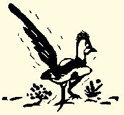
James Fennimore, miner, gambler, adventurer, nicknamed "Ole Virginny" because of his home state, was chosen to christen Virginia City, worlds greatest mining camp. "Ole Virginny" liked his whiskey so well he substituted cold tea for the whiskey in the bottle.
|
|
THUNDERBIRD RANCH Palm Springs, California |
Dear Harry:
Your answer to my request for advertising space in your paper that our Ranch is not Western enough has got me boiling mad. I'm going to make this the gol' darndest westernistspot in this valley and in another year you'll be crawling to me asking for an ad.
In answer to your 30 true or false questions by Lloyd Smith of Palm Springs Desert Museum. 1-There are 30 poisonous spiders in the world and while they all belong to the same species, as the Black Widow, they aren't all Black Widows.
4-The Gila Monster's mouth I looked in had fangs in his upper jaw and eh warn't no exception.
15-The face of San Jacinto may be the sheerest in the United States but America takes in a little too much territory.
All the rest of Smith's statements are true which is more than I can say for you, you gol darned prevaricating old reprobate.
Yours,
Frank Bogart
P. S. Am all out of scrap books, better send 50 more. They just fit the holes where my windows get broken and bein good heavy paper help keep the sand out.
The Barber of Calexico
A Desert Rough Cut by Harry Oliver
Calexico is a California-Mexican border town—across the border is Mexicali. In naming these towns they just chopped words in two and swapped halves, and the people in these towns just as mixed as the towns' names.
 The "Spanish-Italian" barber shop is at No. 14 First Street and about seventy feet from the border line. Across the street is a rival barber shop of Japanese lady barbers. Leo and Tony are the proprietors of the Spanish-Italian barber shop. Leo is from sunny Mazatlan and chock full of music. Tony comes from a small town near Naples. The Japanese lady barbers come from Japan. Leo's girl friend Frieda comes from Minnesota, is a large domineering Swede and should not be here in the desert at all; yet it was her restlessness that made our hero take the chances here set on paper.
The "Spanish-Italian" barber shop is at No. 14 First Street and about seventy feet from the border line. Across the street is a rival barber shop of Japanese lady barbers. Leo and Tony are the proprietors of the Spanish-Italian barber shop. Leo is from sunny Mazatlan and chock full of music. Tony comes from a small town near Naples. The Japanese lady barbers come from Japan. Leo's girl friend Frieda comes from Minnesota, is a large domineering Swede and should not be here in the desert at all; yet it was her restlessness that made our hero take the chances here set on paper.
Here is the story; Leo, his girl friend, and Tony, one hot night, when she, Frieda, was more critical than usual, saw a newsreel of a notorious Mexican bandit parading for American newspapermen. It was when the kid in the seat in front of them quit crying that each of the three had time for a thought. Leo's, to himself, "I must get astride a horse and feel the wind of the hilltops." Frieda's, out loud, "That hombre wouldn't let Japanese lady barbers take his dollars from him"; Tony (who should have been a Hollywood make-up man, and had once made a desert rat look like Hitler), with a well-trained eye saw the same mannerism, saw, and itched for the chance to work on Leo. (Yes, he chuckled, tomorrow he would make a gay desperado of his pardner for sure).
In the barber shop next day, Tony, who had found a photograph of the notorious desperado, combed Leo's hair and trimmed his mustache, commenting on the resemblance, as Leo mimicked the desperado.
Then the daily newspaper told of the desperado's new complications with the U. S. Government, as well as the Mexican. Leo read of the Bandit's wild sweethearts, and went alone to the picture theater to see his hero, and after the show, crossed the line to the "Owl" and laughed and drank and forgot all about Frieda.
Reader: This was just to be a Desert Rough Cut, but it turned into a motion picture. It was the cavalry coming into that last paragraph I guess.
Now our barber slips out from under the thumb of domineering sweetheart to straddle a horse and practice the gestures of the desperado. This continues as he holds up mock victims, substituting rocks and cows for people.
(Shoot it in Borego. The badlands would be great scenery.)
Leo, charging in the moonlight, shouts his "Stick 'em up," and is much surprised when a man emerges from behind the rocks, hands in the air, kicking a bag of loot toward Leo. Our secret bandit is forced to take the loot, and starts on his merry way to the exciting life he has been mimicking.
This leads to his arrest, which appears in the headlines of all the papers. Because it is more exciting than barbering, he doesn't dispute the many crimes he is credited with. The real bandit's tiger-girl smuggled him a hack saw. His Swedish sweetheart is very much bemuddled. He gets threatening letters from the real bandit, (who finally breaks jail, the jealous rat) and ends our motion picture—a desert story with Japanese lady barbers, U. S. Cavalry, Mexican bandits and tiger-girls.
This desert country of ours sure has a lot to offer those motion-picture makers.
From Bob Wagner's Script, November 4, 1939.
![]()
It was Sam Slick who said—Braggin' saves advertisin'.
Buffalo Bill, Bill Hart, Tom Mix, Gene Autry, and Roy Rogers have missed this one.
Back in 1857 Jerry Lynch who made millions in the "Lady Bryan Mine" (at Virginia City, Nevada), had his horses shod with silver shoes.
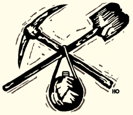 Read this PIONEERTOWN then thank Paul Smith, Editor, Drama of the Comstock "Museum of Memories," Virginia City, Nev., for the idea.
Read this PIONEERTOWN then thank Paul Smith, Editor, Drama of the Comstock "Museum of Memories," Virginia City, Nev., for the idea.
Nickle got its name from "kupfernickel," a German term expressing the disgust of miners who on searching for copper (kupfer) and finding ore that seemed to contain it, but didn't, said it was the work of Old Nick. Later the demon metal came to be known as nickel.
Tombstone Epitaph
Utah Centennial commission has officially defined the term, pioneer, in connection with centennial observances as one who immigated into Utah previous to completion of transcontinental railroad May 10, 1869.
Tombstone Epitaph
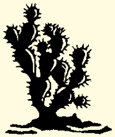
Cabot Yerxa, old timer of burro days, (Desert Hot Springs since 1913), says the only difference between an Alaskan sourdough and a Desert Rat is about 4 pair of blankets and 6 pair of socks. Cabot was in the "Cape Nome Alaska" gold rush of 1900, and the "Cape Prince of Wales" stampede of 1905.
Chicago means skunk in Indian.
THE BATTLE OF VALIERE CORNER
A BLOW BY BLOW ACCOUNT OF GENIUS VS. A THOUSAND DOBE BRICKS
The Editor thinks John (dobe patter) Hilton, The Winner.
ADOBE
By John Hilton
I now have a fine adobe art gallery thanks to Harry Oliver. No he didn't mix any of the mud not lay any bricks. He just laid his hand on my shoulder one day and started talking in that fatherly manner of his and how his beard quivering with emotion as he waxed lyrical on his favorite subject.
"John you should build something out of "dobe old pal. I know you express yourself with paint and in writing and that guitar of yours but you don't know real self expression till you build out of 'dobe. Why it's fire proof, earthquake proof, rat proof and almost fool proof against bad design and besides that, layjng adobe bricks is good for the soul.
Th idea took root as most screwy ideas do in what some folks refer to as my brain. As much to my own surprise as anyone, I found myself up to my neck in 'dobe this fall (I mean literally).
I discovered that Harry was so very right about expressing oneself! Why the first time a huge 'dobe brick broke while I was hoisting it in place and each half landed on one of my feet, I expressed myself in a manner that brings a glow of pride to me even now. Then there was the time a big blob of fresh mud dropped and plugged my pipe and left ear while I was stooping to pick up another brick and the days when I batted gnats with mud covered hands until I looked like a bargain counter Al Jolson, and the day I climbed hurriedly down the ladder and shook hands vigorously with an old friend before she could protest. You should have heard her express herself! Then there was the afternoon when I slipped on a gb of wet mud and landed on my cement floor with a sixty pound brick in my lap. And the other time—but why should I go on. There is positively nothing on earth like building with 'dobe to make one express himself.
The gallery is finished and it's a wonderful feeling (like hitting yourself on the head with a hammer because it feels so fine when you stop). I think I am going to be proud of my gallery when my neck loses its stiffness enough for me to really look it over. Its rustic native appearance is partly due to the fact that I laid my level in the sun the first day and it exploded and the next day I dropped a brick on the square and threw it five eights of an inch out of line. Then theres the hand rubbed effect; (The doc says I'll grow new skin and finger nails in a few weeks); and those hand trimmed bricks on the corner with the odd angle (that's where I split my thumb) and the general effect! Why it looks as authentic as an Oliver Movie set! Better come and see the place but in the meantime friends, try building something out of adobe. It's good for the soul and its heat and cold proof, sound proof bullet and termite proof, etc, etc. In fact the only thing it isn't is work proof.
See John's ad in this packet.
We Ship 'Round the World
Just Send us YOUR GIFT LIST and . . .
WE DO THE REST
Dates from America's Desert Oasis
Coachella Valley, California
VALERIE JEAN
DATE SHOP
Readers Digest found Russ Nicoll. You Write to
him, THERMAL, CALIF.
![]()
NOTHING SPECIAL
Because our desert was full of soldiers a few years back I got out my old scrap books—clippings from a daily Desert column I wrote for years—I wanted them to get acquainted with three mysteries and fun of this Desert lettin' them know there was more'n just sand.
There's 44 pages of desert Lore in this book, counting front and back cover, most of the good stuff I have reprinted in this paper—and what I have not used will come along soon—there aren't any pictures, its called 99 days in the Desert with Sandy Walker—you can have one for 2 bits postpaid.
Harry Oliver THOUSAND PALMS, CALIFORNIA
This space can be had next packet. Cost you $20.00, that is if your ad is western enough for this paper. 10 ads — 20 bucks — 200 bucks. I'll make this thing pay yet. (I got my water paid for 3 years and it only costs me 90c a month for coal oil.) —The Ed.
GOLD
$70.00 AN OUNCE
(From the Denver Mining Record)
The gold miner in just trading dollars when he mines the yellow metal and sells it at $35 an ounce with the wage scale and supply costs at the present high figures. Mine wages in our western mining districts were never as high as they are today. The cost of powder, drill steel, machinery and most every item that enters into mine development is far above normal price levels. The United States owns about 60% of the world's gold stocks.
This nation has refused to allow the price of gold to advance as other commodities have advanced. This is not fair to the gold miner. As Great Britain is the world's greatest gold producer, it would seem right that the policy of the United States in holding the price of gold to $35 an ounce, when the open market price in foreign countries is at a higer level, is disastrous to the British Empire. Paper money is so cheap in terms of gold that purchases little of the yellow metal.
The head of the operating end of the British government suggests that the United States distribute its gold hoard to the nations of the world. We have been giving away our pants ever since the end of the war and now it is suggested that we go naked. Secretary Ernest Bevin of Britain does not suggest how the gold of the U. S. can be distributed without this nation taking a loss for every ounce that it realeases. An official of the U. S. Government says the proposal is cock-eyed, and so it appears.
There is something wrong when the greatest gold producing nation of the world is near bankrupt, notwithstanding its great output of the yellow metal. The Washington administration is bull-headed in preventing gold to attain a supply and demand price. Such action would probably save the British empire from bankruptcy. South Africa an Canadian gold mines could speed up production and furnish London with a greater supply of the metal. This could be done only if the price of gold was doubled so as to sell closer to the persent market price. As long as the United States pegs the price of gold at the present fictitious low quotation of $35 an ounce, the great gold mines of the world will continue to just change dollars to keep running. Some sensible action should be taken to set the world right and stop this continual demand for money and supplies from foreign countries.
Desert Rat from Brewery Gulch Says:
An' now everybody kin buy er thing called er COMPOS-A-TUNE, an write music whether he knows enythin' 'bout music er not. Now we all knows where they gits all the dam noise that cums out the juke boxes.
—Brewery Gulch Gazette, Bisbee Arizona
Western Books
WE SPECIALIZE IN BOOKS AND MAGAZINES ABOUT THE OLD WEST, THE MOUNTAINS, THE DESERTS, LOST MINES, BURIED TREASURES, PROSPECTING, GEMS, MINERALS, HISTORICAL CHARACTERS, NEW, OLD, RARE, ITEMS FOR RESEARCH
GHOST TOWN
BOOK & ROCK SHOP
Knott's Berry Place
BUENA PARK, CALIFORNIA
THE ALL YEAR SPOT OF THE DESERT
DESERT BEACH
SALTON SEA
PLAY..In the Sun - In the Water and Under the Wind

250 Feet Below Sea Level
Salton Sea...A beautiful inland body of salt water...area 306 square miles, 250 feet below sea level. Its salt content is twice that of the ocean...Its surface the fastes motor boat course in the world.
Swimming and Boating
Desert and Seashore Homesites
9½ Miles East of Meca, California
HOW TO GET ALONG IN MEXICO
Is JUST ONE of the many interesting bits of information contained in
SONORA SKETCH BOOK
by JOHN W. HILTON
(Illustrated by the author)Chapters have such titles as:
The Love Life of the Jumping Bean
The Social Aspects of Carrying Water
The Illiterate Book Seller
The Beggar Who Smelled Like Violets$5.00 at your Book Store
John Hilton will Personally Autograph your copy if ordered through
Hilton's Art and Gem Shop
THERMAL, CALIFORNIA
OLIVER TWISTS DESERT RAT SCRAP BOOK PAGE 5
If you have been in the desert long enough to have become slightly tetched in the head you'll like this Desert Rat Newspaper
SQUAW WOOD
The Arizona green jay is green, blue and yellow.
☆
Your cat would think you "NUTS" if she saw you at a food ball game.
☆
From Brazil comes a flexible stone. It will bend of its own weight.
☆
The belief that a decapitated snake will survive until sundown is a myth.
☆
Insects are very clean constantly washing themselves with their antennas.
☆
Toads are said to quench their thirst through their skin, people too, get a skin full.
☆
The Cowboys of Texas and New Mexico have a new day—they are racing tumble weeds.
☆
Prof. Bouvier, noted zoologist of Paris, has proved that wasps have a marvelous memory.
☆
A pair of rats could invite more than 20,000,000 descendents to their golden wedding anniversary.
☆
"Speeding Tourist Crashes Through Billboard." His only chance to get a glimpse of the scenery.
☆
"Gold is the most luseless thing in the world." Said Henry Ford. (The wealthiest man in America.)
☆
The town of Fairplay, Colorado, is planning a monument to a faithful burro that labored so many years in the mines of that region.
☆
A donkey which had worked 14 years in a mine at Pikeview, forgot grass was good to eat and refused to eat it when brought to the surface.
☆
Peculiar chemical properties of Soap Lake in Central Washington, have turned most of the children of the little community into redheads.
☆
Beside "Lightning bugs" there are thirty-six orders of animal life, not to speak of the great number of fungus plants that produce flashes.
☆
Gum will never take the place of Bull Durham with the desert dwellers, gum packages haven't any little tags that can be hung outside the shirt pocket.
☆
In the years 1851, '52 and '53 there were more desperados in Los Angeles than in any place on the Pacific Coast. San Francisco with its great population not excepted.
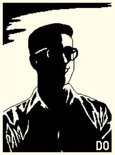
All text was hand-entered (no OCR scans) by Dick Oakes who did the layout, markup and graphics reproduction (all of Harry's misspellings retained). The contents remain the property of Bill Lincoln and his heirs.
